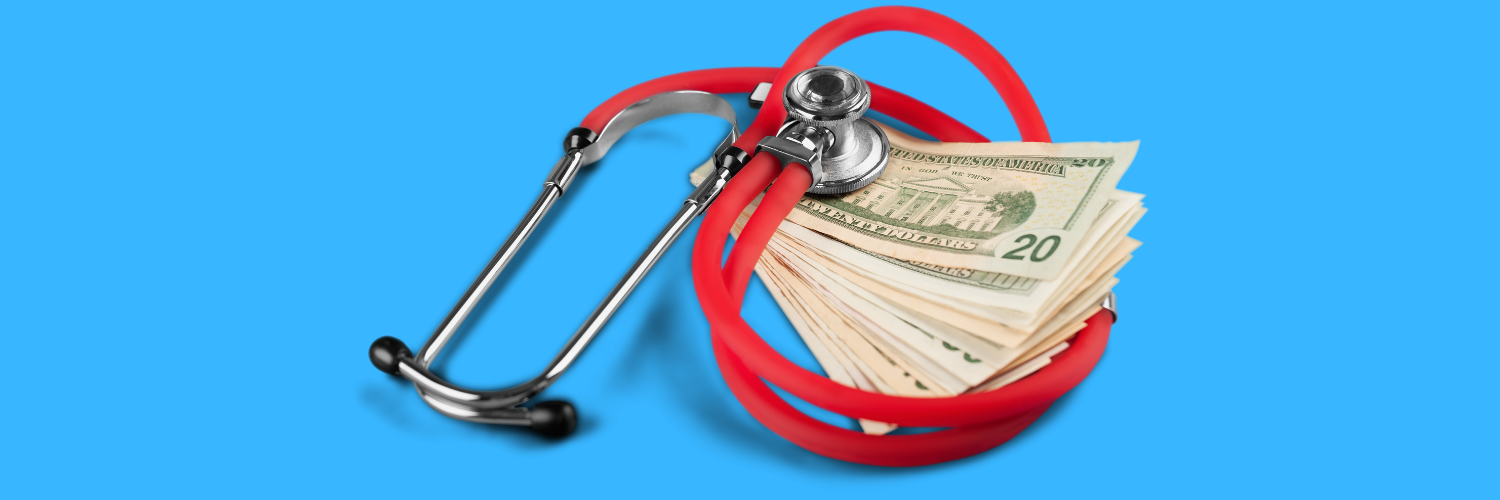How can I negotiate medical bills to make my costs lower?

American healthcare costs are astronomical. The average deductible is slowly moving up; per the Kaiser Family Foundation, the average deductible for a single person more than tripled from 2009 to 2018, moving from $533 to $1,350. Nearly one in five Americans have faced a “surprise medical bill” -- an unexpected charge that appears in the mail -- over the past two years. Across the 50 states, an average of 18% of emergency room visits result in an emergency medical bill. Things like ambulances and air lifts leave patients saddled with debt. Even things like lab tests and X-rays rack up dollars on the medical bill. Simply put, medical bills are too damn high.
For those without insurance, it’s of course much worse: “... they're getting charged on average 4.2 times the hospital's actual cost,” says Braden Pan, the CEO and founder of RESOLVEMedicalBills, a company that aids patients in the negotiation process.
Some members of Congress hope to tackle the problem of surprise medical bills through legislation. There are four bills pending and one actually has a hope of passing. But until new regulations are in place, unfortunately, we must face the shock and horror of medical bills. And that’s not just a figure of speech. Medical debt, like most debts, does not just dissipate when you cannot pay it. A hospital in Virginia actively sues patients that do not pony up the cash for their medical bills. Other hospitals resort to debt collectors or debt collection agencies.
The good news is, negotiating your medical bill is quite possible. Pan estimates that ResolveMedicalBills cuts medical bills under $40,000 an average of 50%. When the bill goes above $40,000, that percentage shoots up to 70%.
First things first: Find the price
When you purchase an item of clothing, you get to look at a tag and see a price (give or take some tax). What a concept. Assessing your medical costs is much easier if you do the same. The thing is: Hospitals and insurers make that price tag a lot more difficult to find. Ask your provider for the exact name of the procedure and follow up by asking for its five-digit code under the Healthcare Common Procedure Coding System. If you cannot find the code, you may be able to get it on https://clearhealthcosts.com/. Once you have the code, you may take it to your insurer, who should be able to get you a quote on the particular procedure. Get everything in writing. This will help you contest surprise bills if they pop up post-procedure.
Offer to pay in cash up front
Paying for a procedure without your insurance -- aka “paying in cash” -- can lead to surprising discounts. Removing the insurance company is a mutually beneficial move: The patient gets to skip filing a claim with their insurance, and the hospital does, too. Plus, the hospital gets payment for the procedure on the spot -- no waiting around for a mailed check necessary. But of course make sure you’re not overpaying.
Tips For Negotiating Your Medical Bill After You’ve Received It
Medical bills -- especially the massive, blow-up-your-savings variety -- often arrive a few months after the medical procedure. After you open the bill in the mail, here’s what you can do next.
1. Examine your explanation of billing (EOB)
When you engage in any sort of medical activity, your insurer will (or should) send you an explanation of billing. This is a list that details exactly what you will be paying for. This is where CutMyMedicalBills.com comes in: The company specializes in looking for “medical necessity” in the procedures listed in the explanation of billing.
“There are guidelines that govern medical necessity. So, let’s say you show up for a headache. There’s no need to order a CT scan, unless you meet the criteria,“ says Sami Kimani, a case manager for CutMyMedicalBills.com. CutMyMedicalBills.com connects patients with physicians who then audit the EOB. If the physician finds something in the billing that is not necessary, you can file a medical dispute. Legally, Kimani says, hospitals often have the higher ground, given that you will sign a form “agreeing” to pay after you’ve been admitted. However, per Kimani, the charges must be for procedures that were medically necessary. They also must be priced “within reason.” You can catch hospitals red-handed breaking both guidelines. Once the dispute has been filed, the debt is null and void until the hospital responds.
2. Call your insurance company
The easiest – though often the most laborious – way to lower costs associated with medical expenses is to call your insurer. Mistakes happen in medical billing quite often, and do not be afraid to ask your insurance to explain each charge on your bill.
3. Call the hospital
“One thing for patients to keep in mind is, when they have a really big bill, hospitals are very unlikely to collect it,” says Pan. Pan’s company uses data to find a more suitable price. Once this (much lower) price is found, they reach out to the hospital with an offer. In the case of very large bills, this tends to work. “If a patient actually goes to a hospital with some data and an offer up front, a smart hospital will engage and start thinking about that,” Pan adds. Another crucial tip: Make sure you talk with a person higher on the corporate ladder than the first person you reach on the phone.
4. Ask if there any discounts or coupons available
Yes, they exist. Maybe the facility in question offers financial help. Often, financial help has a broader reach than you would imagine.
5. Ask what the Medicare price is for your procedure; Offer to pay it.
The “Medicare price” for a procedure is exactly as it sounds: the price something would cost if you were on Medicare (if you’re not). The number tends to be significantly lower than what your private health insurer would pay. This method is very similar to the “cash up front” method. If you tell the hospital you are willing to pay the Medicare price immediately, the hospital will likely say yes. Remember, that in the case of large bills, ones that the hospitals just want a portion of the money paid by any means necessary.
What happens if I don’t pay my medical bill?
If you do not pay your medical bill, the debt may be passed to a debt collector. "'About thirty percent of hospitals sell their medical debt,' says Craig Antico, the co-founder of the nonprofit RIP Medical Debt. RIP is a unique nonprofit that works like a debt buyer. The company purchases bundled portfolios of medical debt from hospitals and from debt collectors on the secondary debt market, often for pennies on the dollar. When the purchase is made, these debts are effectively dissolved and recipients receive a yellow RIP letter in the mail. To date, RIP has dissolved almost $1.4 billion in debt.
Bear in mind this can negatively affect your credit score, but only after six months have passed. The delay is due to the fact that hospitals make so many billing errors that they need a six-month grace period to correct the bill. In other words, medical debt has a "chilling period" of six months because hospitals make so many billing errors. Effectively, you have six months to correct the debt before it starts to hurt your score.
If a hospital decides to sue you for medical debt, you will first get a final notice in the mail. In this case, you may end up with a lawsuit in your hands. Know that, even in court, you can negotiate your medical bill. If you have filed a dispute over the bill, you can walk into court and tell the jury that the money this debt collector is seeking is under dispute. If it’s under dispute, it is a null debt. “It doesn’t really matter in which page of the collection process you are, because the breakthrough is the same,” says Kimani. “However, the earlier [you file], the better [the] results.” At any point in the debt collection process, you can file a dispute with the bill itself.
Can I declare medical bankruptcy?
Yes, but this should truly be the last resort. Medical debts are considered low priority when filing for bankruptcy, so they will dissipate when you file. (Higher priority debts like unpaid taxes will not disappear.) Bankruptcy, though, comes with its own host of issues.
What can I do to negotiate for lower prescription drug prices?
Drug prices are at an all-time high, and many lawmakers say they are on the case. Ideally, you, the consumer, shouldn’t be responsible for lowering your own drug prices. The Medicare Price Negotiation Act, a bill introduced in the 116th congress, seeks to allow the Secretary of Health and Human Services to negotiate for better drug prices for Medicare beneficiaries. This bill has not passed (yet, fingers crossed), so, in the meantime, it would seem we consumers have to do the negotiating ourselves. Sometimes being persistent and making a few key phone calls can help lower your drug bill.
1. Call your drug formulary company
In the case of prescription drug costs, you may have to call the company that runs your drug formulary, usually a pharmacy benefit manager. Drug formularies are where things get complicated. There are a series of “tiers” under which drugs are categorized that determine lower or higher out-of-pocket costs. Drugs in tier 1 are typically preferred generic drugs that will have the lowest copays. Drugs in tier 4 will have the highest copay or coinsurance (a % of the cost not a co-pay). You can usually find your formulary on the summary of benefits and coverage for your plan.
Once you have your formulary, make sure that you are being charged the proper amount for the drug you received. Errors occur in insurance billing quite frequently. Examine your bills.
In the case of certain pharmacy benefit managers, you can file a claim for your prescription drug costs. CVS Caremark, one of the big three PBMS, has a form here that you can fill out to file a prescription drug claim.
2. Ask your doctor if you can be prescribed the generic drug instead
Perhaps the first step to lowering your drug prices altogether is talking with your doctor about your prescription. If your doctor prefers prescribing a brand-name drug with a high co-pay, ask if you might be able to swap to the generic option. The generic may save you in the long run.
See: What’s the difference between a generic and a brand name drug?
What happens if you don’t pay your prescription drug bills?
In the case of prescription drugs, you have to pay for your prescription – unless you plan on robbing the local pharmacy. (Please don’t.)
Learn more about medical bill savings and ways to afford your prescriptions
Why are drug prices so different at different pharmacies?
Why are brand-name drugs so expensive?
How can patients reduce prescription drug costs at the pharmacy counter?
Do you have questions or concerns about safely accessing medication, whether locally or online? We’re here to help.
Comment below or ask a question by logging in to My PharmacyChecker.




